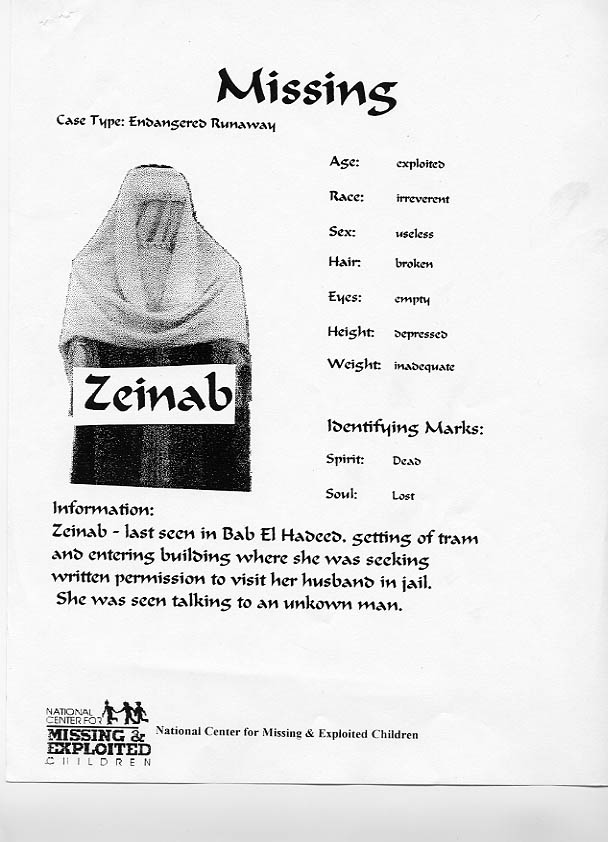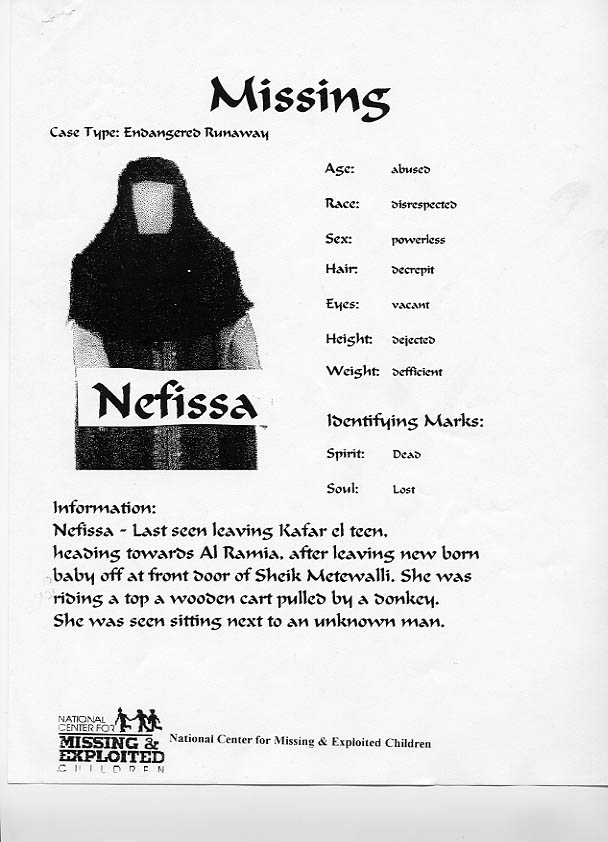God Dies By The Nile

Sisi Katongole
20th Century Literature
Fall 2000
God Dies By The Nile

"Is it possible that moral criteria apply to some people and not others? Is there one morality for the poor and another for the rich? Is there one morality for women and another for men"? (qtd. in Hidden Faces)
One man thought so. He believed that he was above the law and that no rule applied to him. He believed that his status gave him the inalienable right to abuse those beneath him. He believed that respectable women had to be chaste but men did not.
The Mayor of Kafr El Teen, was like the god everyone was afraid to anger or cross. A man above all others. "People have become corrupt everywhere", Sheik Hamzawi once said in earnest. But when he noticed the Mayors angry expression, he quickly added "Except of course where you are dealing with upper class people of noble descent like his highness the Mayor, then it is a different matter" (God Dies 16).
All the Mayor had to do was ask, and whatever he wanted was given to him, "All you have to do is say the word, and weíll push him behind bars" (God Dies 15), Sheik Zahran would tell him.
The Mayor also used his position to exploit the peasants of the village. Sheik Zahran Chief of the village guards knew this, although he dared not say it aloud, "Öhe used his position to exploit the peasants, and to spend the money he squeezed out of themÖon food, tobacco, wine, and women"(God Dies 13). The Mayor not only exploited the peasants, he also exploited the very men that served and protected him, through fear. They were afraid to doubt anything he would say or speak out against him. Because of the power the mayor had over them, they felt it safer to blame each other, and hate each other, then blame or hate the Mayor. "Somehow the voice which had spoken within him sounded strange and frightening, although it had only told him the mayor was a devout man. And yet the word devout itself had echoed inside him very much like the mysterious voice of the devil, so that all of a sudden the word ëdevoutí started to sound more like the word ëdissoluteí. He was seized with panic at the thought that he had insulted the Mayor even though he had only spoken to himself"(God Dies 111). The Mayor was god, he was our god. A god I had no more use for.
It is because of that man the Mayor, that I Zakeya am here today. Am I guilty? Am I innocent? I am not here to plea for one or the other, for we all know that I am guilty. Should I beg for my life? That would be pointless, for we all know that death is assured. I am here, only to plead for the lives of my two nieces Nefissa and Zeinab.
My girls never stood a chance with the Mayor. He took away everything they believed in, he took away everything that they were, he took away their dignity, he took away their values, he took away their worth, in short he took away their humanism.
Please study their pictures, and pass them about, for I am sure you have seen them. Maybe in the market? In another village? In class perhaps?
Their look is unmistakable. It is the look of oppression, for they have no voice, it is the look of exploitation, for they are brought up to be submissive and obedient. It is the look of anger, for no compassion is afforded them.
During my incarceration here, I have been visited by many people, even some who dared show their support for me. One of these people was a womanís right activist Nawal El Saadawi.
She was born in Kafr Tahla, a small village in Egypt, similar to my village Kafr El Teen. She said that "A satanic will must have possessed her that day of her birth in 1931, because Satan is the only one strong enough to fly a banner of rebellion in Godís face" (City Link). The day she was born she says "Öshe was dropped in a basin of water, leaving Allah to decide whether to let her live or mercifully for everyone, let her drown" (City Link). Sorrow had surrounded her birth because she had been born a girl. From that day she has continued to rebel all her life. At ten years old she scared away her future husband by acting as if she escaped from a mad house. "All it cost was a sound thrashing, a low price indeed for a narrow escape. What mattered was that the bridegroom had disappeared like a wispy summer cloud in the wind" (City Link). She witnessed humiliating and unfair practices that deeply marked her life. She has since devoted her life to promoting womenís causes in Arab societies and as a result has suffered the consequences of voicing her opinions (Middle East Times). She lost high level positions in the Egyptian Health industry, her magazine was shut down, an organization she founded "The international organization Arab Womenís Solidarity Association", was banned in Egypt, and she was imprisoned by the government in 1981. In 1992 when her name appeared on a death list she fled to America where she taught at Duke University in North Carolina for five years. "In Africa", she says, " A piece of poetry can make a revolutionÖYou have to start the revolution from here and now. It is a process, and we go on step after stepÖWe have to work together and organize, organize all the time, because there is power in unity...We have to go beyond our class, our gender, our nationality, our color, our religion, and then meet. Itís important. Without that we can not win"(City Link). Nawal El Saadawi, is now back in Egypt, continuing her cause for womenís rights. "I consider myself the voice of the silent majority" she said " My role is to change people" (City Link).
I am sure you can help me find my nieces not only from their pictures but also form the descriptions Nawal El Saadawi has given on the average Arab woman. I am sure you have seen them many times before. I am sure you have heard their story over and over a thousand times before. Their look can not be missed. Is it not the look of somebody you know? The sadness? The hopelessness? The shame? " If a girl makes a mistake before she is married, the sin will never be washed away, even after she marries" (qtd. Hidden Faces).
It is that shame that forced them to flee the village of Kafr El Teen? And
now they are out there, lost, surrounded by not one Mayor but a thousand, yet
strangely "They no longer feel afraid or alone, everything around them
is now familiar, known, lived before. They are a part of this compact mass of
human bodies, and it is like a part of them. Their faces are now only one of
the numerable faces, a drop in the human ocean. A single garment among a million
robes, their voices joined with others in one prolonged imploring chant. More
like a wail of despair then anything else. ëOh God, come to our rescueí"
(qtd. Hidden Faces). 
Works Cited
El Saadawi, Nawal. God Dies By The Nile. New York: Zed
Books, 1985.
Gompu, Sanya. "Nawal Al Saadawi returns to the lionís den".
Middle East Times. 21 pars. 2 Oct. 2000
<http://metimes.com/issue22/eg/5saadawi.htm>.
Hidden Faces (video). Dir. Hunt,C., Longinolto,K., and
Fathay,S. Women Make Movies, 1990.
McMillan, Stephanie. "Dissident from Birth". City Link.
(Oct 1999). 2 Oct. 2000
<http://home.earthlink.net/~minsec/words/isis.htm>.